Prostate cancer affects one in every eight men in America. Research indicates that low doses of THC and other cannabinoids inhibit prostate carcinoma growth. THC has analgesic properties as well, making it an interesting option for cancer pain management.
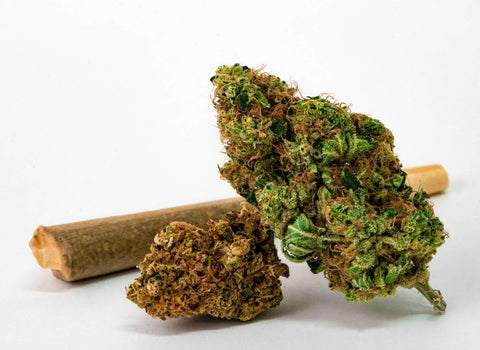
THC and CBD seem to offer major contributions to cancer therapeutics. For example, recent studies show that cannabinoids inhibit prostate cancer cell growth.
However, research on cannabis and prostate cancer has used lab-grown cells—or has involved animal studies. More research is needed to better understand the role of cannabinoids in fighting human prostate cancer and the potential clinical applications of cannabis in treating this disease.
Beyond cancer, people are using cannabis microdosing for a variety of other conditions. Many people microdose THC for sleep as a way of fighting insomnia and other sleep disorders. Low doses of THC can also treat migraines, chronic pain, and inflammation.
Read more about the benefits of microdosing THC.
Understanding Prostate Cancer
Prostate cancer occurs in the prostate gland, a small walnut-shaped organ that produces sperm. Once established in the prostate, the cancer can spread to other organs. An early prostate cancer diagnosis gives patients the best hope for successful treatment and remission; advanced prostate cancer is much harder to treat successfully.
In early stages, the disease may show no symptoms. More advanced prostate cancer may show signs such as:
- Blood in the urine
- Blood in the semen
- Difficulty and pain while urinating
- Bone pain
- Weight loss
- Reduced sexual function
Prostate cancer is one of the most common types of cancer in American men, second only to non-melanoma skin cancer. The American Cancer Society estimates nearly 270,000 cases of prostate cancer in 2022 alone. Men above the age of 60 are more likely to be diagnosed.
The survival rates for prostate cancer patients are good, according to the American Cancer Society. If the disease is caught early, survival rates are over 99%.
Prostate cancer treatments focus on curing or controlling the disease so it affects everyday life as little as possible. Treatments usually combine surgery, radiation therapy, hormone therapy (androgen-deprivation therapy), chemotherapy, and immunotherapy.
Many prostate cancer patients experience unpleasant side effects from cancer treatment such as chemotherapy—not to mention from the cancer itself.
That’s why many patients turn to more effective, natural ways to treat cancer and to mitigate the side effects of conventional cancer therapies. Microdosing THC is gaining attention for its ability to improve the lives of prostate cancer patients. Our hemp-derived THC gummies contain low doses of Delta 9 THC in concert with other cannabinoids. Their beneficial properties make these microdosing edibles a highly effective treatment of prostate carcinoma.
Cannabis and the Endocannabinoid System
THC, CBD, and other cannabis compounds interact with the endocannabinoid system. Both THC and CBD seem to act as anti-cancer agents on prostate cancer cells.
The endocannabinoid system (ECS) is a network of signals and receptors found in all mammals. It regulates important bodily functions, such as pain perception, memory processing, sleep, appetite, reproduction, and our immune system. Dysfunction of our ECS is directly associated with a wide range of diseases: neurodegenerative disorders, glaucoma, inflammation, various types of cancer, and more.
THC binds directly to CB1 and CB2 cannabinoid receptors in the ECS. This interaction tends to increase dopamine levels in the brain and produce the euphoric, psychoactive effects typically associated with smoking marijuana. CB1 receptors are found mostly in the brain and they are responsible for pain-relieving properties of cannabis. Stimulation of CB2 receptors, in turn, may promote apoptosis (self-destruction) of cancer cells.
A study review suggests that, given their antitumor properties, THC and cannabidiol (CBD) might improve the efficacy of conventional antitumor drugs. In the review, THC, CBD, and even synthetic cannabinoids were explored in treating breast and prostate cancer.
Since it has no psychoactive properties, CBD does not make you high. Its interaction with CB1 and CB2 receptors appears to have anti-inflammatory, antianxiolytic, and anticonvulsant effects—CBD can reduce inflammation, alleviate anxiety, and mitigate epileptic seizures. Many people microdose CBD to alleviate chronic pain, as well, and improve sleep quality.
Our CBD gummies for sleep are one fool-proof way to experience all the benefits of CBD. These delicious vegan gummies are perfect for maintaining a healthy nighttime routine. Sleep Plus gummies contain 25mg of CBD and together with low doses of THC and melatonin, they promote sleep and relaxation.
The ECS and Prostate Cancer
The prostate gland is intimately tied to the endocannabinoid system. Evidence suggests that prostate cancer negatively affects the ECS, which points to the ECS serving an important role in prostate homeostasis.
The endocannabinoid system consists of receptors—like CB1 and CB2—and cannabinoid enzymes that help synthesize, transport, and degrade endocannabinoids. Many of these are localized to prostate tissue. CB1 and CB2 receptors and two major endocannabinoids (anandamide and 2-arachidonoylglycerol) inhibit prostate cancer cell proliferation, control the invasive behavior of many types of cancer cells, and cause apoptosis.
In the presence of prostate cancer, levels of cannabinoid receptors and endocannabinoids undergo major fluctuations. This results in rapid disease progression. One study indicates that higher tumor expression levels of CB1 receptors is directly associated with worse prostate cancer outcomes.
The Role of THC and CBD in Fighting Prostate Cancer
Research on cannabinoids and prostate cancer suggests that medical cannabis can help regulate and prevent cancer cell growth. This means cannabinoids like THC and cannabidiol might be used as a treatment of prostate cancer.
Taken together, CBD and THC seem to offer the greatest antitumor effect via a proposed synergy known as the entourage effect.
The Entourage Effect
In the entourage effect, CBD, THC, and other cannabinoids are thought to multiply each other’s benefits. The beneficial effects of cannabidiol become more pronounced when CBD and THC are taken together. CBD downregulates the effects of THC on our brain by decreasing the likelihood of psychoactive effects (e.g., tachycardia, sedation, anxiety, paranoia) that normally come with excessive THC intake.
There are several safe ways to consume cannabis for the entourage effect. Our Delta 9 edibles are a popular way to combine the strengths of THC, CBD, and other cannabinoids—like CBN—to work for you.
Some people choose to microdose cannabis products that don’t contain THC. This is possible with our CBN-infused gummies that contain a unique blend of CBD and CBN—but no THC.
Broad spectrum CBD gummies also do not contain any THC. The combination of CBD and minor cannabinoids, terpenes, and flavonoids is a powerful fighter against insomnia, stress, and chronic pain cancer patients deal with on a regular basis. However, there are a few crucial differences between broad spectrum and full spectrum CBD when it comes to beneficial properties on our health.
In addition to CBD, CBN, CBC, CBG, and other cannabinoids, full spectrum CBD also contains THC, making full spectrum products ideal for cancer patients; THC and CBD each show potential in slowing cancer, so it makes sense to take the two together.
Additionally, low doses of THC and CBD can help alleviate anxiety, and the combination of the two cannabinoids appears to help with pain relief and nausea better than either compound in isolation.
Try our full spectrum gummies packed with all major and minor cannabis compounds. Because of the low amounts of THC in them, these vegan edibles are unlikely to make you “high”—but they’ll deliver all of the benefits of microdosing cannabis.
Read our article on THC vs CBD to understand more about the differences between the two major cannabinoids.
Anti-Proliferation Effect of Cannabis
A 2014 study highlighted anti-proliferative properties of cannabinoids. “Proliferation” is the spreading of cancer via cell growth and cell division. With most forms of cancer (including prostate cancer), cancer cells grow and spread more rapidly than normal cells. This is how cancer takes over the body’s tissues.
If cannabis indeed slows cancer proliferation, that’s a big deal. It seems to do so for many types of cancer, from lung cancer to prostate cancer.
Italian researchers found that the combination of CBD and THC slows or even prevents cancer angiogenesis (the formation of new blood vessels). Apparently, stopping angiogenesis is one mechanism whereby cannabis exerts an anti-proliferation effect on cancer.
Anti-Metastatic Effects of THC and CBD
The process of cancer cells migrating to and infecting other cells and organs is called metastasis. According to a 2016 clinical study, cannabinoids can actually block metastasis, including metastatic prostate cancer.
Research—published in the National Library of Medicine—suggests that when phytocannabinoids (cannabinoids from plants) act on tumor cells, the following happens:
- Apoptosis is promoted: cannabinoids have a pro-apoptosis effect. By targeting CB2 receptors, non-THC cannabinoids inhibit prostate carcinoma growth by inducing apoptosis (cell death).
- Tumor angiogenesis is suppressed: THC, CBD, and other cannabinoids inhibit the blood supply to prostate cancer cells, inhibiting their ability to develop new blood vessels—an important component of tumor growth.
- The activity of androgen receptors (which can stimulate tumor growth) is reduced.
The majority of research conducted on cannabinoids and prostate cancer involved systematic review of animal models. More studies are needed on the effects of cannabinoids on human prostate carcinoma.
THC and CBD for Inflammation
CBD has anti-inflammatory properties. It can treat neuropathic pain, rheumatic pain, and inflammatory bowel syndrome by reducing cytokines (proteins that promote inflammatory responses). According to a study review, CBD and THC help reduce cytokine activity, which in turn lowers oxidative stress and inflammation.
In a review article published by Frontiers in Pharmacology, CBD has demonstrated anti-inflammatory properties in several experimental models, in vitro and in vivo. This helps alleviate various inflammatory-related degenerative diseases and types of cancer.
THC, in turn, has pain-relieving and anti-inflammatory properties of its own. Many people microdose THC to reduce inflammation and alleviate chronic pain caused by chronic inflammatory conditions.
THC and CBD Alleviate Side Effects
CBD and THC might help improve the overall quality of life in cancer patients. Nearly every day, prostate cancer patients deal with a plethora of side effects—both from the cancer itself, as well as from cancer treatments such as chemotherapy.
- Stress
- Anxiety
- Clinical depression
- Lack of sleep, insomnia
- Poor appetite and eating disorders
- Nausea and vomiting
- Chronic pain
- Neuropathy associated with chemotherapy and radiation therapy
One study that explores the role of cannabidiol in cancer treatment suggests that CBD can successfully manage many life aspects of the sufferers as they battle cancer.
Cannabinoids Can Help With Nausea and Vomiting
One of the most common side effects of chemotherapy is nausea and vomiting. A recent double-blind, placebo-controlled study examined the efficacy of cannabinoids in treating nausea related to chemotherapy. The results show that THC and CBD extracts are effective anti-nausea treatment options, producing equivalent results to traditional medication, without the associated side effects.
Among other responsibilities, the endocannabinoid system regulates a specific region in our brain (medulla oblongata) whose primary function is to control the reflexes that trigger nausea and vomiting. THC and CBD have demonstrated antiemetic properties, most likely via interaction with the medulla oblongata.
Fighting Insomnia
Lack of sleep is another frequent side effect of cancer. CBD and THC can improve sleep, inducing relaxation in cancer patients. People who suffer from insomnia experience a significant improvement after taking nama’s CBD gummies for sleep. These delicious vegan gummies contain hemp-derived CBD and in combination with other cannabinoids and melatonin work miracles on your nighttime routine.
Much of that insomnia that cancer patients struggle with come from increased levels of stress. CBD can help with stress and anxiety by soothing the mind and the body.
Appetite-Promoting Properties
Many prostate cancer patients suffer from reduced appetite and struggle to maintain healthy weight. Recent research on the role of cannabinoids in controlling appetite have confirmed the centuries-long claim that cannabis sativa promotes eating. THC has shown to be particularly effective in treating conditions that involve reduced appetite and weight loss, like cancer and chemotherapy.
According to an article published in Society for the Study of Ingestive Behavior, THC stimulates appetite. This is crucial for those that suffer from extreme appetite loss, as inadequate eating inhibits recovery from cancer and other ailments.
THC Increases Dopamine Levels
Depression and anxiety are common experiences for cancer patients. Recent studies show how optimal levels of Delta 9 THC increase dopamine levels in our brain.
Dopamine is a neurotransmitter, a hormone that constantly travels between neurons and influences a wide range of brain and bodily activity. When the flow of dopamine is interrupted, our brain experiences low dopamine levels, resulting in decreased happiness and motivation, and increased chance of depressive disorders.
Many people turn to microdosing THC for depression. Small amounts of THC release dopamine in the brain by mimicking a natural cannabinoid in our endocannabinoid system, anandamide. Anandamide plays an important role in regulation of energy, appetite, and mood. By filling anandamide’s shoes, THC can indirectly cause mood elevation with people suffering from carcinoma.
Our Bliss Gummies might be the best cannabis product to elevate your mood. These vegan edibles contain low doses of THC and CBD—only five milligrams each—to stimulate dopamine production. As a bonus, it will help with nausea and pain symptoms at the same time.
Cannabis for Pain Management
Pain management is a critical issue for prostate cancer patients. According to a review article of five clinical studies, THC is an effective method of treating pain at low doses. Higher doses of THC seemed to have increased cancer-related pain in some clinical studies, while lower doses reduced pain.
Best THC and CBD Dosage for Prostate Cancer
2-10mg of THC combined with 2.5-10 mg of CBD seem to have the best effect on prostate cancer, one study found. Effective THC to CBD ratios included 1:1 and 1:2.
Our Euphoria Gummies contain an equal ratio of 10mg Delta 9 THC and 10mg CBD. These fruity vegan gummies are packed with natural ingredients and a custom formulated blend that promotes mood and appetite while reducing pain.
If you’re looking for lower cannabinoid concentrations, try our Energy Delta 9 THC Gummies. These edibles contain 2.5 mg of THC with 5mg of CBD (1:2 ratio) and also contain other beneficial ingredients (B12, L-theanine).
Does Delta 8 THC Treat Prostate Cancer?
Delta-8-tetrahydrocannabinol (Delta 8 THC) seems to help with prostate cancer symptoms and side effects. Delta 8 has powerful antiemetic properties, making this minor cannabinoid an effective treatment of chemotherapy-related nausea (“An Efficient New Cannabinoid Antiemetic in Pediatric Oncology”).
In 2004, researchers found that animal subjects treated with low doses of Delta 8 THC showed significant improvements in appetite. This means that Delta 8 also has extraordinary appetite-stimulating properties.
Apart from reducing nausea and improving appetite, Delta 8 also seems to aid pain relief, reduce inflammation, and alleviate symptoms of anxiety disorders. It produces anxiolytic effects on its users, reducing stress and anxiety.
Read more on the differences between Delta 8 and Delta 9 THC, and how both cannabinoids can boost your health.
If you’re interested in including Delta 8 THC to your daily routine, try our Elevate Gummies. These vegan edibles contain 12.5 mg of hemp-derived Delta 8 THC, tested in a third-party lab to ensure quality and safety.
Product QUIZ
Need help deciding what product is best for you? Take our quiz, just three questions until your perfect match!
Cannabis and Testosterone Levels
The relationship between prostate cancer, cannabis, and testosterone is a complicated one. The exact causal linkage of testosterone levels to the progression of prostate cancer is still unclear. Clinical literature also struggles to show whether medical cannabis increases or decreases testosterone levels in men.
Some clinical trials seem to suggest that cannabis has a negative impact on men’s reproductive hormones, decreasing testosterone levels. Other studies, however, show increased testosterone levels. In one study, rhesus macaques were given edible THC every day. Chronic THC exposure resulted in significant testicular atrophy and reduced testosterone and serum levels.
A 2020 study published in the World Journal of Urology shows contrasting results. It seems that men who consumed cannabis regularly had higher testosterone levels compared to those who did not report using THC or other cannabis extracts.
Testosterone levels naturally drop with age, but also with increased BMI (body mass index) and decreased physical activity. Although it has been hypothesized that increased testosterone causes prostate cancer, no such evidence has been found. In his book, The Virility Paradox, Charles Ryan, MD, asserts that higher levels of testosterone do not cause prostate cancer, but may exacerbate existing cancer.
Androgen-Deprivation Therapy
Androgen-deprivation therapy (ADT), or hormone therapy, aims to reduce levels of male hormones (androgens). This treatment option is based on research that shows correlation between high testosterone levels and the development of prostate cancer.
As already proposed, androgens and androgen receptors seem to stimulate tumor growth. Lowering their levels can stop or slow prostate cancer to develop or metastasize. Cannabis seems to target tumors with antiandrogenic effects.
Cannabis Legality
How Delta 9 products are federally legal (when marijuana-derived cannabis products are not) remains a mystery for many people. A piece of legislation colloquially known as the 2018 Farm Bill (The Agriculture Improvement Act of 2018) opened a loophole for the hemp industry by defining “industrial hemp” as different from marijuana. Read our article on the differences between hemp and marijuana to further understand this.
Let’s look into the legality of cannabis.
Is Delta 9 THC Legal?
Delta 9 THC is federally legal if derived from hemp and if the THC content of a product does not exceed 0.3% by dry weight.
Marijuana remains federally illegal, even though the use of recreational and medical marijuana is legalized in many states.
All of our Delta 9 edibles are federally legal across the US. However, before deciding on a purchase, make sure Delta 9 THC is legal in your state, as different states have different legislative regulations.
Is CBD Legal?
Under the Farm Bill, CBD derived from hemp is legal on a federal level.
Marijuana-derived CBD is currently federally illegal in the United States. It is considered a controlled substance in some US states, but its legal status varies from state to state.
All our products—such as melatonin gummies with CBD—are federally legal, as they are compliant with the Farm Bill.
Is Delta 8 Legal?
Because they are compliant with the 2018 Farm Bill, all nama CBD’s Delta 8 products are federally legal—they are derived from the hemp plant and contain no more than 0.3% of THC by dry weight.
Despite federal legality, fourteen US states still ban Delta 8 products outright:
- Alaska
- Arkansas
- Arizona
- Colorado
- Delaware
- Iowa
- Idaho
- Kentucky
- Montana
- Mississippi
- New York
- Rhode Island
- Vermont
- Utah
Best Microdosing Edibles for Prostate Cancer
Combinations of THC and CBD might be more effective treatments for prostate cancer than either cannabinoid in isolation. Take a look at some of our top products for suppressing symptoms of nausea and vomiting, increasing appetite, improving sleep, and reducing pain in prostate cancer patients. Additionally, some cancer research suggests that THC and CBD in these products may promote antitumor activity via a pro-apoptotic effect and anti-angiogenesis action.
- Sleep Plus Gummies are an ideal choice for those struggling with insomnia. 25 mg of CBD and 2 mg of THC work together to promote healthy 8-hour-sleep every night. This unique blend of terpene-rich hemp extracts is backed by 3mg of melatonin and infused with the most relaxing blackberry lavender flavor.
- We’ve said this before, but we’ll say it again: an equal ratio of CBD to THC can do wonders for chronic pain management. Euphoria Gummies are an obvious choice when it comes to alleviating pain and getting rid of the nasty side effects of chemotherapy.
- Our Bliss Gummies also contain an equal CBD to THC ratio, albeit in lower concentrations. Bursting with honeydew melon flavor, these vegan edibles are designed to bliss up your evenings without breaking a sweat.
- Energy Gummies do not only contain 2.5 mg of THC and 5 mg of CBD, but also L-theanine. L-theanine is a phyto-amino acid that promotes relaxation and sleep. In combination with the entourage effect produced by low doses of THC and CBD, L-theanine and our delightful Energy Gummies can calm your nerves and reduce your anxiety without causing drowsiness.
- Delta 8 Gummies contain 12.5 mg of pure hemp-extracted Delta 8 THC—with an unforgettable flavor—that can help alleviate those tiring symptoms of nausea and chronic pain.
Cannabis and Prostate Cancer FAQ
Is Delta 8 stronger than Delta 9?
When it comes to potency, we can say that Delta 9 THC is stronger than Delta 8. One study dubs Delta 8 “Delta 9 THC’s nicer younger sibling” due to milder psychotropic effects.
Consuming Delta 8 produces a milder feeling of relaxation and pain relief, without interfering with the daily activities or causing intense euphoric effects. In fact, researchers who surveyed Delta 8 users reported that low doses of Delta 9 THC can produce the same mild effects as higher doses of Delta 8.
Do androgen receptors help fight prostate cancer?
Androgen receptors are important for maintaining prostate health. They are involved in the development of many bodily systems responsible for prostate homeostasis, but also aid tumor growth. A study published in Journal of Molecular Endocrinology showed that decreased androgen receptor expression and prostate specific antigen (PSA) levels in prostate cancer cells also help induce apoptosis.
One of the main treatments for metastatic hormone-sensitive prostate cancer is called androgen-deprivation therapy (ADT). Levels of androgens made naturally by the testicals are reduced with surgery or medicine. Low levels of androgen receptors seem to prevent further prostate cancer cell growth, but hormone therapy alone does not cure the disease.
Are edibles safer than smoking marijuana?
Marijuana cigarettes contain many of the same chemicals found in tobacco. As a result, smoked marijuana might be a contributing factor to developing lung cancer, according to one study.
Smoked marijuana comes with more adverse effects than consuming edibles. Microdosing edibles is also a better consumption method when it comes to controlling dosages. With every gummy, you know the exact amount of cannabinoids and other ingredients.
Try our Delta 9 edibles and see how easy and effective it is to microdose THC.
Is CBD or THC better for inflammation?
One difference between the effects of THC and CBD on inflammation and pain is that THC adjusts the mind’s perception of pain, while CBD works at its source. This means both cannabinoids are effective at reducing inflammation, but CBD’s properties might be more physical than THC’s.
For the best results and the most effective treatment against inflammation and pain, we recommend THC and CBD together. Take our Relax Plus Gummies for an example. They contain 25mg of CBD and a low dose of THC (5mg) to produce a light buzz, enhance relaxation, and reduce pain caused by inflammation.
What medical conditions are treated with THC?
There are numerous ways cannabis interacts with our body to positively impact our health and wellbeing. Low doses of THC are safe to incorporate to your daily routine if you want to feel better, but also if you’re suffering from a medical condition.
Here are some of the ways THC can help you (beyond treating prostate cancer and cancer pain):
- Microdosing cannabis treats glaucoma: low doses of THC reduces eye pressure and alleviates symptoms of glaucoma.
- THC helps people suffering from dementia, Alzheimer’s, and other neurodegenerative diseases: both THC and CBD together act as neuroprotectants and can even help reverse brain aging and memory loss.
- You can microdose THC and CBD for depression.
- THC also helps people suffering from ADHD and PTSD.
What are the side effects of CBD?
Anecdotal evidence suggests that CBD does not have any serious adverse effects. Excessive amounts of CBD can result in short-term side effects such as low blood pressure, confusion, and drowsiness, but they typically subside within a few hours.
All our nama CBD products contain low doses of CBD, so there is no need to worry about side effects.
Where can I buy Delta 9 THC products?
If you live in a state where medical marijuana is legal and you have a medical marijuana card, you can buy Delta 9 THC products at a cannabis dispensary near you.
If you don't have a medical marijuana card, don't live in a state where marijuana is legal, or don't want to drive to a Mary Jane dispensary, you can get our Delta 9 edibles delivered right to your door. These fruit-flavored edibles with Delta 9 THC are the ideal way to microdose Delta 9!
nama CBD FDA & Legal Disclaimer
Our products are not intended to diagnose, treat, cure, or prevent any disease. They are not a replacement for prescription medications and have not been evaluated by the Food and Drug Administration (FDA).
The information provided on this website does not, and is not intended to, constitute legal advice or any statements of the status of any laws. Any information, content, and materials available on this site are for general informational purposes only, and are not intended to be relied upon for any purpose.
Readers of this website should contact their attorney to obtain advice with respect to any particular legal matter including decisions on what products are, or are not, legal to sell, possess, or consume. No reader, user, or browser of this site should act or refrain from acting on the basis of information on this site without first seeking legal advice from their own counsel in the relevant jurisdiction.
Only your individual attorney can provide assurances that the information contained herein – and your interpretation of it – is applicable or accurate for your particular situation. Use of, and access to, this website or any of the links or resources contained within the site do not create an attorney-client relationship between the reader, user, or browser, and website authors, contributors, contributing law firms, or committee members and their respective employers.
More From the nama Family
Small batch edibles crafted for different times of the day and experiences.
More articles
About
Learn
Join us on this journey

© Copyright 2025 nama Products LLC. All Rights Reserved.
†These statements have not been evaluated by the Food and Drug Administration. These products are not intended to diagnose, treat, cure or prevent any disease. All information presented here is not meant as a substitute for or alternative to information from health care practitioners. Please consult your health care professional about potential interactions or other possible complications before using any product.
††The information provided on this website does not, and is not intended to, constitute legal advice or any statements of the status of any laws. Any information, content, and materials available on this site are for general entertainment purposes only, and are not intended to be relied upon for any purpose.
123 John Doe Street
Your Town, YT 12345
Store Hours
Sun: Closed
Mon-Fri: 9:00 - 17:00
Sat: 10:00 - 13:00
What to expect at pickup
Closed
Closing at 5pm
Closing at 5pm
Closing at 5pm
Closing at 5pm
Closing at 5pm
Closing at 1pm





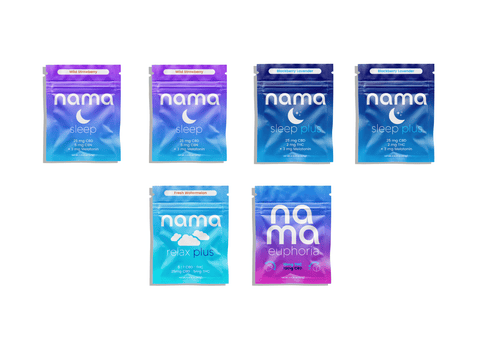
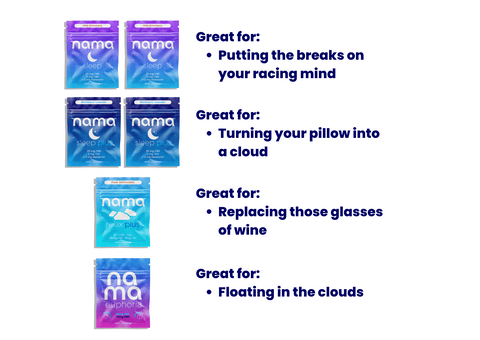
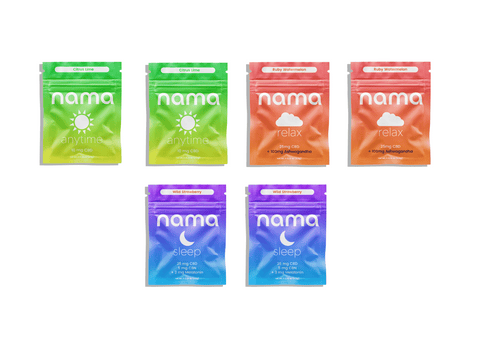
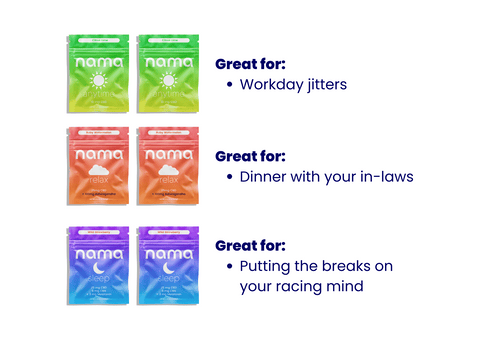
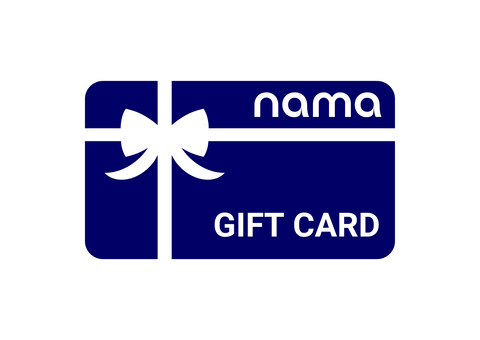







![Buzz Packs™ [THC and CBD Powder Drink Mix]](http://www.namacbd.com/cdn/shop/files/nama_buzz_packs_thc_drink_pack_white_background.png?v=1741884660&width=480)
![Buzz Packs™ [THC and CBD Powder Drink Mix]](http://www.namacbd.com/cdn/shop/files/Buzz_Packs_Label.png?v=1741884660&width=480)


![Buzz Drops™ [THC Drink Drops]](http://www.namacbd.com/cdn/shop/files/nama_thc_buzz_drops.png?v=1711412866&width=480)
![Buzz Drops™ [THC Drink Drops]](http://www.namacbd.com/cdn/shop/files/buzz-drop-wine-comparison.png?v=1736882023&width=480)


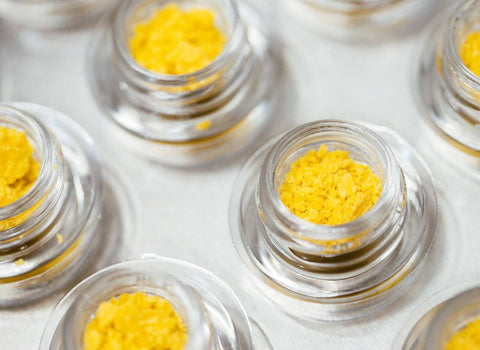


Comments (0)
There are no comments for this article. Be the first one to leave a message!